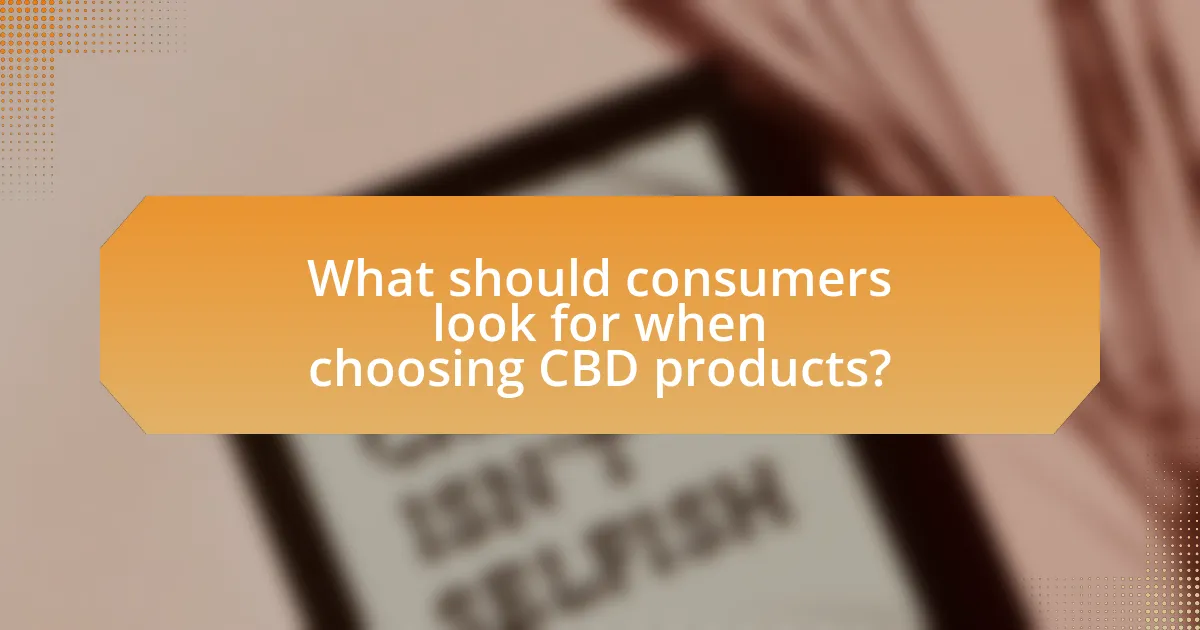High-quality CBD products are defined by their purity, safety, and efficacy, derived from organically grown hemp and subjected to rigorous third-party lab testing. Consumers can identify these products by examining Certificates of Analysis (COAs) that confirm cannabinoid content and the absence of harmful contaminants. Key characteristics of high-quality CBD include transparency in sourcing, accurate labeling, and effective extraction methods. The article provides guidance on how to choose high-quality CBD products, highlighting the importance of brand reputation, consumer reviews, and understanding different product types and formulations. Additionally, it addresses common misconceptions about CBD and offers practical tips for making informed purchasing decisions.

What are High-Quality CBD Products?
High-quality CBD products are those that contain pure cannabidiol extracted from hemp plants, free from harmful additives and contaminants. These products are typically sourced from organically grown hemp, ensuring that they are cultivated without pesticides or synthetic fertilizers. High-quality CBD products undergo rigorous third-party lab testing to verify their cannabinoid content and ensure they are free from heavy metals, solvents, and other impurities. This testing provides consumers with transparency and confidence in the product’s safety and efficacy. Additionally, reputable brands often provide Certificates of Analysis (COAs) that detail the results of these tests, further validating the quality of their CBD offerings.
How can consumers identify high-quality CBD products?
Consumers can identify high-quality CBD products by examining third-party lab test results, which verify the product’s cannabinoid content and purity. High-quality CBD products typically provide a Certificate of Analysis (COA) from an independent laboratory, confirming that the product is free from contaminants such as heavy metals, pesticides, and solvents. Additionally, consumers should look for products derived from organically grown hemp, as this indicates a commitment to quality cultivation practices. Transparency in sourcing and manufacturing processes further enhances product credibility, allowing consumers to make informed choices based on verified information.
What are the key characteristics of high-quality CBD products?
High-quality CBD products exhibit several key characteristics, including third-party lab testing, transparency in sourcing, and a clear indication of cannabinoid content. Third-party lab testing ensures that the product is free from contaminants and accurately labeled, providing consumers with confidence in its safety and efficacy. Transparency in sourcing means that the manufacturer provides information about the origin of the hemp, which is crucial for assessing quality. Additionally, a clear indication of cannabinoid content, including the levels of CBD and THC, allows consumers to make informed choices based on their needs. These characteristics are essential for ensuring that consumers receive effective and safe CBD products.
How does the source of CBD affect product quality?
The source of CBD significantly affects product quality by determining the purity, potency, and safety of the final product. CBD derived from organically grown hemp tends to have higher quality due to lower levels of pesticides, heavy metals, and other contaminants, as supported by studies indicating that organic farming practices enhance cannabinoid profiles. Conversely, CBD sourced from low-quality or non-organic plants may contain harmful residues and lower concentrations of beneficial compounds, which can compromise efficacy and safety. Additionally, the extraction method used, often influenced by the source, plays a crucial role in preserving the integrity of the cannabinoids and terpenes, further impacting the overall quality of the CBD product.
Why is it important to choose high-quality CBD products?
Choosing high-quality CBD products is crucial because they ensure safety, efficacy, and consistency in therapeutic effects. High-quality CBD products are typically derived from organically grown hemp, which minimizes exposure to pesticides and heavy metals, thus reducing health risks. Additionally, reputable manufacturers conduct third-party lab testing, providing transparency regarding cannabinoid content and the absence of harmful substances. Research indicates that high-quality CBD can effectively alleviate symptoms such as anxiety and chronic pain, while low-quality products may contain insufficient or excessive levels of CBD, leading to ineffective or adverse outcomes. Therefore, selecting high-quality CBD products is essential for achieving desired health benefits while ensuring consumer safety.
What potential risks are associated with low-quality CBD products?
Low-quality CBD products pose several potential risks, including contamination with harmful substances, inaccurate labeling, and ineffective dosages. Contamination can occur due to the use of poor-quality hemp or inadequate extraction processes, leading to the presence of pesticides, heavy metals, or solvents. A study published in the Journal of the American Medical Association found that nearly 70% of CBD products tested were mislabeled, indicating that consumers may not receive the intended dosage or may ingest unwanted compounds. Additionally, low-quality products may lack the therapeutic benefits associated with high-quality CBD, resulting in wasted money and unmet health expectations.
How can high-quality CBD products enhance user experience?
High-quality CBD products enhance user experience by providing consistent potency, purity, and effectiveness. These products are often derived from organically grown hemp and undergo rigorous third-party testing, ensuring they contain minimal contaminants and accurate cannabinoid profiles. For instance, a study published in the Journal of the American Medical Association found that only 30% of CBD products tested were accurately labeled, highlighting the importance of quality assurance in enhancing user trust and satisfaction. By choosing high-quality options, consumers can expect reliable effects, such as reduced anxiety or improved sleep, leading to a more positive overall experience.

What should consumers look for when choosing CBD products?
Consumers should look for third-party lab testing when choosing CBD products. This ensures that the product has been independently verified for potency, purity, and the absence of harmful contaminants. Reputable brands provide Certificates of Analysis (COAs) from accredited laboratories, which detail the cannabinoid profile and confirm that the product meets safety standards. Additionally, consumers should consider the source of the hemp, as organic and sustainably grown hemp typically results in higher quality CBD. Transparency in labeling, including clear dosage information and ingredient lists, is also crucial for informed purchasing decisions.
How do lab tests contribute to the quality of CBD products?
Lab tests enhance the quality of CBD products by verifying their cannabinoid content, purity, and safety. These tests ensure that products contain the advertised levels of CBD and other cannabinoids, which is crucial for consumer trust and efficacy. Additionally, lab tests identify contaminants such as pesticides, heavy metals, and solvents, ensuring that the products are safe for consumption. For instance, a study published in the Journal of the American Medical Association found that nearly 70% of CBD products tested were mislabeled regarding their cannabinoid content, highlighting the importance of lab testing in confirming product accuracy and safety.
What information should be included in a Certificate of Analysis (COA)?
A Certificate of Analysis (COA) should include the product name, batch or lot number, testing date, and the name of the testing laboratory. Additionally, it must detail the specific cannabinoid profile, including concentrations of CBD, THC, and other cannabinoids, as well as the presence of terpenes. The COA should also report on contaminants such as pesticides, heavy metals, and microbial content, ensuring the product’s safety and compliance with regulations. This information is critical for consumers to verify the quality and potency of CBD products, as it provides transparency and assurance regarding what they are purchasing.
How can consumers verify lab test results for CBD products?
Consumers can verify lab test results for CBD products by checking for a Certificate of Analysis (COA) provided by an independent laboratory. A COA details the cannabinoid profile, including the levels of CBD and THC, as well as tests for contaminants like pesticides and heavy metals. To ensure the validity of the COA, consumers should confirm that the lab is ISO-accredited and that the test results correspond to the specific product batch number. This process helps consumers ascertain the quality and safety of the CBD products they intend to purchase.
What are the different types of CBD products available?
The different types of CBD products available include CBD oils, CBD capsules, CBD edibles, CBD topicals, CBD vapes, and CBD isolates. CBD oils are liquid extracts that can be taken sublingually or added to food and beverages. CBD capsules offer a convenient way to consume a precise dosage. CBD edibles, such as gummies and chocolates, provide a tasty option for ingestion. CBD topicals are creams and balms applied directly to the skin for localized relief. CBD vapes allow for inhalation of vaporized CBD, providing quick effects. Lastly, CBD isolates are pure forms of CBD without other cannabinoids or compounds. Each product type serves different consumer preferences and needs, making it essential to choose based on individual requirements.
What are the differences between full-spectrum, broad-spectrum, and CBD isolate?
Full-spectrum, broad-spectrum, and CBD isolate are three distinct forms of CBD products. Full-spectrum CBD contains all cannabinoids found in the cannabis plant, including THC (up to 0.3%), which may enhance the entourage effect, potentially providing greater therapeutic benefits. Broad-spectrum CBD includes multiple cannabinoids but is THC-free, making it suitable for those who want to avoid THC while still benefiting from other cannabinoids. CBD isolate is the purest form, consisting of 99% pure CBD without any other cannabinoids, terpenes, or THC, making it ideal for individuals seeking the effects of CBD alone without any other compounds.
How do different forms of CBD (oils, edibles, topicals) affect quality and use?
Different forms of CBD, including oils, edibles, and topicals, affect quality and use based on their bioavailability, onset time, and intended application. CBD oils typically offer higher bioavailability, allowing for quicker absorption into the bloodstream, which can lead to faster effects, often within 15 to 30 minutes. In contrast, edibles have lower bioavailability due to the digestive process, resulting in a delayed onset of effects, usually taking 30 minutes to 2 hours, but they provide longer-lasting relief. Topicals, designed for localized application, do not enter the bloodstream but interact with cannabinoid receptors in the skin, making them effective for targeted relief of conditions like inflammation or pain. This distinction in absorption and application underscores the importance of selecting the appropriate form of CBD based on individual needs and desired effects.

How can consumers ensure they are purchasing high-quality CBD products?
Consumers can ensure they are purchasing high-quality CBD products by verifying third-party lab testing results. High-quality CBD products are often accompanied by Certificates of Analysis (COAs) from independent laboratories, which confirm the product’s cannabinoid content and check for contaminants such as pesticides, heavy metals, and solvents. According to a 2020 study published in the Journal of Cannabis Research, over 70% of CBD products tested did not contain the levels of CBD claimed on their labels, highlighting the importance of lab testing for quality assurance. Additionally, consumers should look for products derived from organically grown hemp, as this reduces the likelihood of harmful chemicals being present.
What role do brand reputation and transparency play in product selection?
Brand reputation and transparency significantly influence product selection by establishing consumer trust and confidence. A strong brand reputation indicates reliability and quality, which are crucial for consumers, especially in markets like CBD where product safety and efficacy are paramount. Transparency, such as clear labeling and accessible third-party testing results, further enhances consumer trust by providing verifiable information about product ingredients and sourcing. Research shows that 73% of consumers are willing to pay more for products from brands that demonstrate transparency (Label Insight, 2016). This correlation underscores the importance of both factors in guiding informed purchasing decisions.
How can consumers research a CBD brand’s history and practices?
Consumers can research a CBD brand’s history and practices by examining the brand’s website, reading third-party reviews, and checking for lab test results. The brand’s website typically provides information about its founding, mission, and production processes, which can reveal its commitment to quality and transparency. Third-party reviews on platforms like Trustpilot or Leafly offer insights from other consumers regarding their experiences with the brand. Additionally, reputable CBD brands often publish lab test results from independent laboratories, which verify the potency and purity of their products, further demonstrating their adherence to industry standards.
What customer reviews and testimonials should consumers consider?
Consumers should consider customer reviews and testimonials that provide detailed experiences with the CBD product, focusing on effectiveness, quality, and side effects. Reviews that mention specific benefits, such as pain relief or anxiety reduction, are particularly valuable, as they offer insight into the product’s performance. Additionally, testimonials that discuss the sourcing of ingredients and manufacturing processes can indicate product quality. For instance, reviews from verified purchasers on platforms like Trustpilot or consumer reports often highlight these aspects, providing a more reliable perspective on the product’s efficacy and safety.
What are some common misconceptions about CBD products?
Common misconceptions about CBD products include the belief that CBD causes psychoactive effects, that all CBD products are the same, and that CBD is a cure-all for various health issues. CBD, or cannabidiol, is non-psychoactive, meaning it does not produce the “high” associated with THC, the psychoactive component of cannabis. Additionally, the quality and formulation of CBD products can vary significantly; not all products contain the same concentration of CBD or are derived from the same source, which affects their efficacy. Furthermore, while some studies suggest potential therapeutic benefits of CBD for conditions like anxiety and epilepsy, it is not a universal remedy and should not replace conventional medical treatments.
How do myths about CBD affect consumer choices?
Myths about CBD significantly influence consumer choices by creating misconceptions that can lead to either hesitance or overconfidence in product efficacy. For instance, the belief that CBD can cure serious diseases without scientific backing may lead consumers to overlook necessary medical treatments, while the myth that all CBD products are equally effective can result in poor purchasing decisions. Research indicates that misinformation can skew consumer perceptions, as a survey by the Brightfield Group found that 70% of CBD users are influenced by anecdotal evidence rather than scientific research. This reliance on myths can ultimately affect the quality of products consumers choose, as they may prioritize brands based on misleading claims rather than verified quality indicators.
What facts should consumers know to make informed decisions?
Consumers should know the source, extraction method, and third-party testing results of CBD products to make informed decisions. The source of the hemp determines the quality and safety of the CBD; for instance, hemp grown in the U.S. is subject to strict agricultural regulations. The extraction method, such as CO2 extraction, affects the purity and potency of the final product. Third-party testing provides verification of cannabinoid content and absence of contaminants, ensuring that the product meets safety standards. According to a 2020 study published in the Journal of Cannabis Research, products that undergo rigorous testing are more likely to contain accurate labeling and fewer harmful substances.
What practical tips can help consumers choose high-quality CBD products?
To choose high-quality CBD products, consumers should prioritize third-party lab testing, which verifies the product’s cannabinoid content and checks for contaminants. Reputable brands provide Certificates of Analysis (COAs) from independent labs, ensuring transparency and quality assurance. Additionally, consumers should look for products derived from organically grown hemp, as this reduces the likelihood of pesticide and chemical exposure. Understanding the extraction method is also crucial; CO2 extraction is considered the gold standard for preserving cannabinoids and terpenes. Finally, consumers should read reviews and check for brand reputation to ensure they are purchasing from trustworthy sources.



